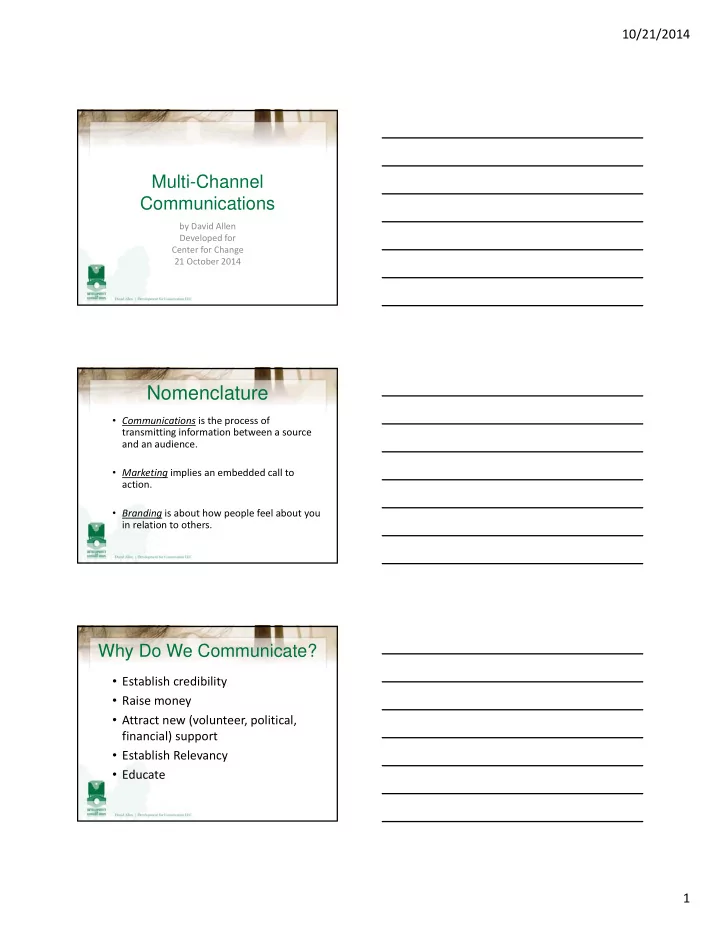

10/21/2014 Multi-Channel Communications by David Allen Developed for Center for Change 21 October 2014 Nomenclature • Communications is the process of transmitting information between a source and an audience. • Marketing implies an embedded call to action. • Branding is about how people feel about you in relation to others. Why Do We Communicate? • Establish credibility • Raise money • Attract new (volunteer, political, financial) support • Establish Relevancy • Educate 1
10/21/2014 With Whom Do We Communicate? • Board Members, former Board Members • Major donors • Members • Former members • Volunteers who are not members • People who visit • General public What are Channels? • Electronic – Website (!), email, e ‐ news, blog • News – Dailies, Weeklies, LTE • Broadcast – Radio, TV, Community Cable • Print – Newsletter, saturation mail, flyers • Video – You ‐ tube, Vimeo, • Social – Facebook, Flickr, Linked ‐ In, Instagram • Telephone – News, Asks, Thank Yous • Face ‐ time – Real ‐ time networking! Conversation Starters It is a mistake to replace paper communications with electronic communications. 2
10/21/2014 Conversation Starters Communicating what you believe is more powerful than communicating what you do . Conversation Starters Two of the most important words in communications are authenticity and relevance Conversation Starters First person is always more effective than third person. Stories are always more effective than descriptions. 3
10/21/2014 Conversation Starters An important aspect of mobile phones (the third screen) is that they remove the barrier between message and action. This trend will continue. Conversation Starters The purpose of Social Media is to foster user interaction. If you can’t get people talking, you can’t succeed. Conversation Starters Grammatically correct is not as important as it used to be. Correct speling is not as important as it used to be 4
10/21/2014 Conversation Starters Repetition aids comprehension. Conversation Starters If you want to communicate powerfully with younger donors , use paper. If you want to communicate powerfully with younger people , use video. Conversation Starters We cannot trust ourselves when it comes to questions about what works (and what doesn’t) in communications. 5
10/21/2014 Conversation Starters The purpose of all electronic communication should be to drive traffic to the website. Conversation Starters Close ‐ up photographs of people and animals are always more effective than pictures of landscapes.* * Unless you spend money on reproduction like the National Geographic or The Nature Conservancy Services Assessment, Planning, Training, Coaching You can raise more money for your organization – I can help. fundraisinghelp@sbcglobal.net 608/239 ‐ 5006 6
D AVID A LLEN I am a non ‐ profit organizational development consultant. I work with organization boards to help their members learn how to be better leaders and advocates. My background includes 30 years working in membership fundraising, major donor development, communications, and marketing. I worked for about half that time for Nature Conservancy (TNC) chapters in Oregon, Texas, and Wisconsin. In addition to my duties for the individual chapters, I served TNC as an internal fundraising consultant and major donor development trainer. In 2000, served as the vice ‐ president of operations for the Wisconsin ‐ based, international conservation organization Sand County Foundation, a position I held through mid ‐ 2009. Gathering Waters Conservancy, a land trust service agency based in Wisconsin, called me in 2002 to ask whether I would be interested in teaching a seminar for Wisconsin land trusts on major donor development. From 2002, then, through 2009, I consulted on a nights and weekends basis with just a few clients each year. In March of 2009, I launched my consulting business full ‐ time using the name Development for Conservation . Also in 2009, I partnered with Peter McKeever and Nancy Moore to form Conservation Consulting Group. Together we help land trusts prepare for accreditation by providing assessment, planning, and leadership coaching services. I consider myself a strategic thinker, problem solver, facilitator, educator, and program developer who brings a particular passion for conservation and the environment. Practice Competencies Fundraising Organizational Development • Development Audit • Strategy Development • Staff/Board Training and Development • Practice & Process Assessment • Major Gift Coaching • Problem Solving Facilitation • Capital Campaigns • Marketing
David Allen Development for Conservation fundraisinghelp@sbcglobal.net 608 ‐ 239 ‐ 5006 608 West Dean Avenue Monona, WI 53716
Recommend
More recommend